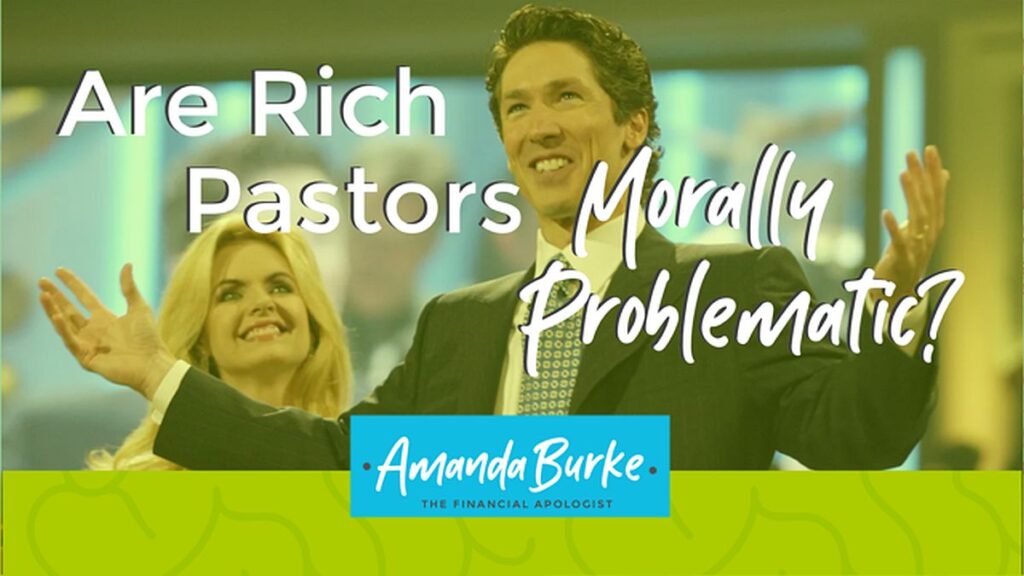In late March, the Washington Post published a story about a man named Ben Kirby who started a unique Instagram account. He took pictures of prominent pastors’ attire, especially shoes, and noted how much these items cost. The price tag of these design clothes is frequently exorbitant. This got us thinking: are rich pastors a moral problem in the church?
Before addressing the central issue, we’d like to preface the fact that we do not believe wealth is inherently immoral. Scripture does not instruct us to live in poverty and there is nothing extra holy about struggling to get by.
However, we are admonished in many passages to be careful of where we place our hopes. Remember the parable of the young rich ruler, who had his hope in his wealth. When Jesus saw where his hope really was, He struck a chord by telling the ruler to give away all he had in order to be saved. The young ruler went away sad because he had great wealth.
The lesson of that parable is not that wealth is an impediment to salvation (contrary to the toxic cultural message). Rather, it is that our hope cannot be in anything temporal. It is easy for those who have much to trust in their wealth instead of God. This is why the warning of Deuteronomy 8 is so important. God enables us to make wealth, and we must honor Him as we use those abilities.
That said, what Kirby is documenting on his Instagram account is something that doesn’t look so great. Elevation Worship’s members wear $800 shoes. Steven Furtick has a new designer outfit each week. T.D. Jakes has a $1,250 Louboutin fanny pack (really, a fanny pack?). And Miami pastor Guillermo Maldonado wears a $2,500 Ricci crocodile belt.
The unsaved world sees this and points out hypocrisy. This is allegedly just more evidence that Christians are selfish and that pastors are all about getting donations from people to enrich themselves. Sometimes these criticisms are sadly warranted.
In certain nations, Prosperity Gospel preachers flood the airwaves and make their sales pitches to people in destitute poverty. They claim that “planting a seed” will enable God to bless the giver with health, wealth, and prosperity. Of course, a closer examination of Scripture shows no such promises (in fact, sometimes quite the opposite). But these televangelists still put their predatory message out there and get people caught up in false hope.
But what about the idea of a pastor who faithfully preaches the Word of God being wealthy and without such chicanery? As we see it, a pastor who happens to be wealthy is not a problem per se. The critical questions are more regarding how that pastor uses what he has, whether he walks in humility, and if he does not place his hope in that wealth.
The rich pastors pointed out by Kirby do not model what a pastor should be doing if he has wealth. The leader of a church ought to dress respectably, and there isn’t anything inherently immoral about being well-dressed. But is it really necessary to buy many outfits that cost hundreds or thousands of dollars? Especially when many in the congregation may be struggling financially?
The 2019 National Study of Millionaires conducted by Ramsey Solutions revealed that a significant number of American millionaires shop at thrift stores. They don’t tend to drive luxury cars, nor do they live in large houses. They live fairly modest lives and are not ostentatious with their wealth. Rather, they work hard, invest wisely and give generously.
These same practices, if carried out by rich pastors, make having such wealth perfectly acceptable. In many cases, pastors who are financially well-off have greater resources to give to those in need and minister to them. So contrary to the idea that our pastors ought to be living at the margins, perhaps we can use more financially secure pastors leading our congregations and modeling the way.
And, of course, all of this must be grounded in the faithful teaching of the Word of God. If that is the anchor for our church leadership, wealth can be a tremendous avenue by which we can advance the Kingdom.

